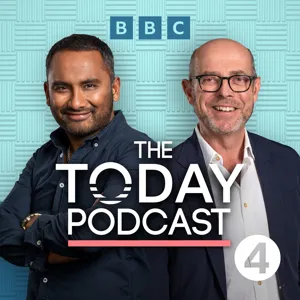Podcast Summary
Online shopping offers convenience and customization for important purchases: Effective crisis management is crucial in the PR world, as seen in the BBC's handling of Huw Edwards' resignation. Online shopping platforms provide convenience and potential savings for customers during special occasions.
When it comes to important purchases like engagement rings or special gifts for Mother's Day, the convenience and customization offered by online shopping platforms like Blue Nile and 1800 Flowers can provide peace of mind. However, the PR world, as shown in the BBC Sounds podcast "When It Hits the Fan," can be a complex and often contentious arena. The resignation of Huw Edwards from the BBC following allegations in the media serves as a reminder of the power of the press and the importance of effective crisis management. In the case of the BBC, questions remain about how they handled the situation and communicated with the public. Meanwhile, for those looking to make purchases, the ease and potential savings offered by online shopping can be a valuable tool. Use promo code "listen" at Blue Nile for $50 off a $500 purchase, and save up to 40% on Mother's Day bestsellers at 1800flowers.com/acast.
BBC's handling of presenter's scandal: Mishandling allegations can lead to reputational damage and the need for transparency is crucial.
The BBC faced a major reputational crisis when a tabloid newspaper published allegations against one of its presenters, Hugh Edwards, without revealing his identity. The situation worsened when Edwards' wife publicly named him and disclosed his mental health issues, leading to a serious episode that required hospitalization. The Metropolitan Police also announced they would take no action. The BBC initially mishandled the situation, failing to escalate the family's complaint promptly. After an independent review and internal investigation, Edwards resigned, and the BBC issued a terse statement. This incident, which caused significant damage to the corporation's reputation, highlights the importance of promptly addressing allegations and the potential consequences of a lack of transparency. The BBC's handling of the situation was criticized for its lack of empathy and valediction towards Edwards, who had served the organization for 40 years.
BBC's handling of Hugh Edwards scandal lacked transparency: Transparent and swift action is crucial in managing crises, preventing media fuel and minimizing uncertainty.
In the face of a public crisis, organizations, particularly large public companies, need to act swiftly and transparently to address allegations of misbehavior at senior levels. The BBC's handling of the Hugh Edwards fan hitter scandal, which was compared to a crisis level 10, is seen as an example of where this did not happen effectively. The lack of transparency in the BBC's initial response allowed the media to fuel the story, keeping the oxygen of public attention on the issue. In contrast, businesses have rigorous processes that kick into action when such allegations arise, involving legal, HR, compliance, and even the board. Providing enough information in public statements is also crucial to prevent reliance on the media and minimize the uncertainty surrounding the situation. While the entertainment industry and business worlds have different approaches to managing talent and executives, the importance of transparency and swift action in managing crises remains a valuable lesson for all organizations.
Maintaining Trust and Ethics in the Workplace: Public figures, including those at the BBC, must uphold high ethical standards to preserve trust and avoid bringing the organization into disrepute. Balancing accountability and avoiding public shaming is crucial.
The BBC, as a public service broadcaster, holds a significant position of trust and responsibility, and its employees, including high-profile figures like Hugh Edwards, should maintain the highest standards to avoid bringing the organization into disrepute. However, the line between acceptable behavior and breaching reputational boundaries can be subjective and raises questions about the concept of "beyond reproach" and potential abuse of power within organizations. The speaker shares a personal anecdote about encountering a drug dealer in rehab, emphasizing that those in positions of power and prestige are not immune to unethical behavior. Ultimately, it's essential to strike a balance between holding individuals accountable for their actions and avoiding a McCarthy-esque era of finger-pointing and public shaming. The discussion underscores the importance of ethical conduct and the need for clear guidelines and consequences for transgressions in professional settings.
The use of euphemisms and non-emotive language in PR can obscure the truth and create misunderstandings.: Being transparent and calling things what they are is crucial for building trust and maintaining credibility during crises.
The use of euphemistic language in communication, particularly during crises, can obscure the truth and create misunderstandings. This was highlighted in the discussion about the BBC's handling of the Hugh Grant scandal and the former CEO of the Post Office's email regarding computer issues that led to wrongful prosecutions. The use of non-emotive language, such as "exception" instead of "anomaly" or "bugs," can make situations seem less serious than they actually are. In PR, it's important to be transparent and call things what they are to build trust and maintain credibility. The BBC, in its unique position, understands the need to justify the license fee and communicate effectively with viewers as taxpayers. However, the use of euphemisms and non-emotive language can create confusion and undermine trust, as seen in the Post Office scandal and the Hugh Grant situation. It's crucial for organizations to prioritize clear and honest communication to build trust and navigate crises effectively.
Honesty is key during a crisis: During a crisis, it's important to communicate honestly and directly, avoiding euphemisms and vague language to build trust and effectively address the issue.
During a crisis, it's crucial to face up to the problem honestly and directly, rather than using euphemisms or trying to hide it with vague language. The speaker shared various examples from their career, such as the infamous horse meat scandal in the UK and the PR world's use of euphemisms for redundancies or strategic reviews. They also mentioned some industries that intentionally over-engineer their language to confuse people or present a positive image, like tobacco companies claiming to work towards a "smokeless world" and "a better tomorrow." The speaker emphasized that being transparent and honest, even if it's uncomfortable, is essential for addressing and resolving a crisis effectively.
Authenticity and transparency matter in crisis communication: The army's handling of a crisis demonstrated the importance of authentic and transparent communication in turning around negative public perception. Preconceived opinions significantly impact how a crisis is perceived.
A company's reputation and how it handles a crisis are not determined by what the company says about itself, but by how the public perceives it. The army's recent handling of a crisis involving spooked horses during exercise in Central London was impressive due to the authenticity and transparency of the statement given by an army person, as well as the ongoing updates and reassurances provided to the public. However, the positive public reaction would have likely been different if the crisis involved the Metropolitan Police instead of the army, given the current public perception of the two institutions. Companies can learn from the army's example of turning around a negative reputation through training and effective communication during crises. Ultimately, how a crisis is perceived is largely influenced by the public's preconceived opinions of the company or institution involved.
The British Army's Focus on Communication Skills and the Monarchy's Effective Communication Strategies: The British Army's emphasis on communication skills for its officers and the Monarchy's effective communication strategies demonstrate the power of investing in these areas for modern leadership and crisis management.
Effective communication is a crucial aspect of modern leadership, and the British Army is a prime example of an institution that recognizes this importance. Officers are trained in strategic communications, resulting in many successful careers in PR and financial PR. To excel in today's world, one must be able to handle crises, think strategically, and understand leadership qualities. The British Army, as a leader in this area, teaches these essential skills. Moreover, institutions with strong media support, like the British Monarchy, can effectively communicate significant news, such as the King's recent health update. The palace's handling of the announcement was excellent, with a 6 PM embargo ensuring widespread coverage at the same time. However, challenges remain, such as managing the public image of controversial figures like Prince Harry. Overall, the British Army's emphasis on communication skills and the Monarchy's effective communication strategies demonstrate the power of investing in these areas.
Exploring the Impact of Instant Messaging on Communication and Interactions: Instant messaging platforms like WhatsApp have transformed how we communicate and interact, from family dramas and Russian state propaganda to planning trips and celebrating Mother's Day.
Instant messaging platforms like WhatsApp have significantly changed the way we communicate and interact with each other, as evidenced by family dramas, Russian state propaganda, and even marriages to AI. This week on BBC Radio 4, Helen Lewis explores these phenomena further in her new series, "Helen Lewis Has Left the Chat." Meanwhile, in other news, Prince Harry's upcoming visit to the UK may bring about a significant reputational threat to the palace, as the media will closely watch whether he meets his father. In more lighthearted news, planning for your next trip just got easier with Quince, which offers high-quality essentials at affordable prices and prioritizes safe and ethical manufacturing practices. And don't forget to celebrate Mother's Day by giving back to the amazing moms in your life with 1-800-Flowers. So whether you're dealing with family drama, engaging with Russian state propaganda, or planning your next vacation, remember that communication and connection have taken on new forms in our modern world. Stay tuned to "When it Hits the Fan" for more insightful discussions, and don't miss Helen Lewis's new series, "Helen Lewis Has Left the Chat," available on BBC Sounds.






